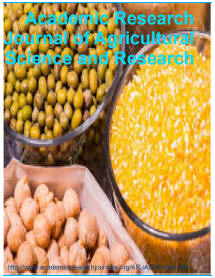| ARJASR |
Academic Research Journal of
Agricultural Science and Research |
||||||||||||||||||||||
|
Academic Research Journal of Agricultural Science and Research Vol. 4(5), pp. 174-183. September, 2016. ISSN: 2360-7874 DOI: 10.14662/ARJASR2016.022
Full Length Research Determination of appropriate fertilizer rate for forage and seed yields of fodder beet (Beta vulgaris) in the central highland areas of Ethiopia
Gezahagn Kebede1*, Getnet Assefa2, Fekede Feyissa1, Alemayehu Mengistu3, Muluneh Minta1and Tadesse Tekletsadik1
1Holetta Agricultural Research Center, P. O. Box 31, Holetta, Ethiopia 2Ethiopian Institute of Agricultural Research, P.O. Box 2003, Addis Ababa, Ethiopia 3Forage and Rangeland Scientist, Urael Branch, P.O. Box 62291, Addis Ababa, Ethiopia *Corresponding author: gezk2007@yahoo.co.uk
Accepted 30 August 2016
The study was conducted to determine the optimum level of chemical and farm yard manure fertilizer mixture for fodder beet (Beta vulgaris) production in the central highlands of Ethiopia. The experiment was designed in a factorial arrangement of four chemical fertilizer rates (0, 5/13, 10/23, 15/33, kg N/P2O5 ha-1) and four farm yard manure fertilizer rates (0, 3, 6 and 9 t ha-1 in dry matter basis) in a randomized complete block design with three replications. The result showed that the interaction between inorganic and organic fertilizers application levels had significant (P<0.05) effect for all measured agronomic traits at Meraro. The establishment performance of fodder beet was very poor both at Holetta and Jeldu using direct seeding method of planting in the first year of production. But, using seedlings raised at nursery as a planting material at Holetta and Jeldu improved the plant survival rate by 52% and 49% respectively. Unlike at Holetta and Jeldu, establishment performances of fodder beet at Meraro using seeds as a direct planting material was promising and found to be an appropriate establishment method. The result showed that application of 10/23 kg N/P2O5 ha-1 + 9 t FYM ha-1 fertilizers as a mixture gave the highest plant survival rate (81.9%), plant height (30.3 cm), leaf DM yield (2.7 t ha-1), tuber DM yield (10.3 t ha-1) and total DM yield (13.0 t ha-1) while the lowest values of the above traits were recorded from the control treatment. Application of fertilizers mixture at a rate of 10/23 kg N/P2O5 ha-1 + 9 t FYM ha-1 increased the survival rate, plant height, leaf DM yield, tuber DM yield and total DM yield by 34, 57, 286, 296 and 294% over the control treatment. But, the highest seed yield (3.0 qt ha-1) was obtained by applying the highest level of fertilizer mixture (15/33 kg N/P2O5 ha-1 + 9 t FYM ha-1) which gave 900% seed yield advantage over the control treatment. Therefore, applying 10/23 kg N/P2O5 ha-1 + 9 t FYM ha-1 and 15/33 kg N/P2O5 ha-1 + 9 t FYM ha-1 fertilizer mixture were found to be the optimum fertilizers mixture rate for forage and seed yields of fodder beet. Therefore, this preliminary result recommends using FYM alongside with mineral fertilizers to increase forage and seed yields of fodder beet. However, further experimental research works should be carried out for more seasons and locations to verify this research findings.
Keywords: fertilizer rate, fodder beet, forage yield, inorganic fertilizer, organic fertilizer, seed yield
How to cite this article: Kebede G, Feyissa F, Assefa G, Mengistu A, Tekletsadik T, Minta M (2016). Determination of appropriate fertilizer rate for forage and seed yields of fodder beet (Beta vulgaris) in the central highland areas of Ethiopia. Acad. Res. J. Agri. Sci. Res. 4(5): 174-183
|
|
|||||||||||||||||||||
